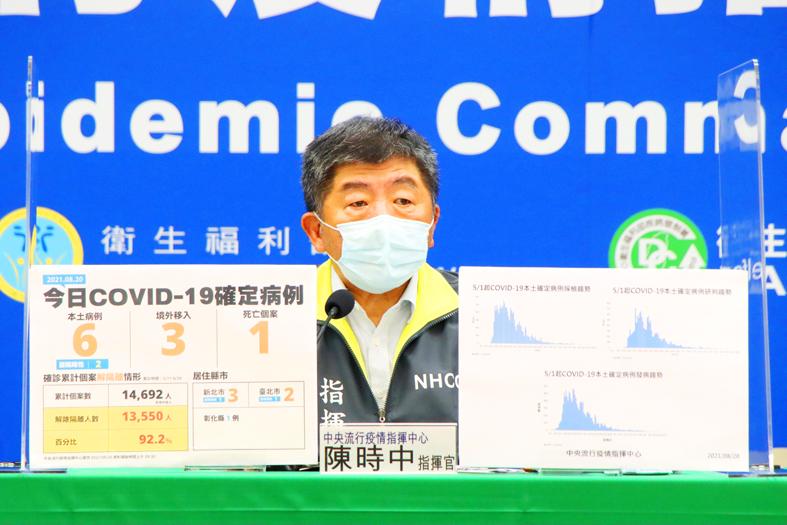The Central Epidemic Command Center (CECC) yesterday reported six local and three imported COVID-19 infections.
Among the local cases, three were reported in New Taipei City, two in Taipei and one in Changhua County, Minister of Health and Welfare Chen Shih-chung (陳時中), who heads the CECC, told the center’s daily news briefing in Taipei.
The three imported cases are two men and one woman, aged in their 20s to 40s, who arrived from Romania, Bangladesh and the UK between Aug. 6 and Tuesday, CECC data showed.

Photo courtesy of the Central Epidemic Command Center
The center also reported one death, a man in his 60s who tested positive on July 17 and died on Wednesday.
Of the 51 imported cases reported from Friday last week to Thursday, genome sequencing results are available for 12 cases, the center said.
All 12 had the Delta variant of SARS-CoV-2, with cycle threshold values between 17 and 26, said Centers for Disease Control Deputy Director-General Philip Lo (羅一鈞), who is deputy head of the CECC’s medical response division.

Photo: George Tsorng, Taipei Times
Among them, seven cases had received two shots of a COVID-19 vaccine, while another case had received one shot, Lo said.
Three of the cases are “breakthrough infections,” as they received two shots of the Moderna COVID-19 vaccine at least 14 days ahead of testing positive, he said.
As of yesterday, Taiwan had recorded 67 cases of the Delta variant, 54 imported and 13 local, he said, adding that the local cases were linked to a cluster in Pingtung County.
Since July 2, the CECC has conducted genome sequencing for 164 local cases, who all had the Alpha variant, Lo said.
As of 10am yesterday, 39.49 percent of Taiwan’s 23.5 million residents had received a first shot of a COVID-19 vaccine, while 745,301 people had received two shots, CECC data showed.
Most experts are of the opinion that increasing the first-dose vaccination coverage is most important at this stage, Chen said.
Some experts have suggested that the center reserve Moderna doses for second-dose vaccination of high-risk groups, instead of for government officials in vaccination priority group 2.
Chen appeared reserved about the suggestion.
About 1,700 central government officials and 20,000 local government officials had received a first shot of the Moderna vaccine, which has a limited effect on the nation’s vaccine stock, Chen said, adding that officials in group 2 are crucial to maintaining operations of key infrastructure.
CECC data showed that 751,195 people had booked vaccinations with the domestically made Medigen COVID-19 vaccine, which are to start on Monday next week.
Meanwhile, the CECC yesterday called on people not to break the law, saying that two centralized quarantine facilities have caught deliveries of drugs concealed in personal items sent to quarantined people.
The facilities are in Taipei’s Yangmingshan (陽明山) area and New Taipei City’s Linkou District (林口), Chen said.
Cigarettes, alcohol, lighters and matches were also among the banned articles seized at the facilities, he added.
All items sent to people in quarantine facilities have to undergo strict checks, Chen said.
CECC medical response division deputy head Victor Wang (王必勝) wrote on Facebook that some people had complained about strict management at the facilities, such as baggage and package checks, and bans on smoking and drinking alcohol.
However, the measures are necessary given that the facilities accommodate people from different backgrounds and have to maintain public order.
He said he hopes that quarantined people understand the rules and cooperate with the facilities.

Eight restaurants in Taiwan yesterday secured a one-star rating from the Michelin Guide Taiwan for the first time, while three one-star restaurants from last year’s edition were promoted to two stars. Forty-three restaurants were awarded one star this year, including 34 in Taipei, five in Taichung and four in Kaohsiung. Hosu (好嶼), Chuan Ya (川雅), Sushi Kajin (鮨嘉仁), aMaze (心宴), La Vie by Thomas Buhner, Yuan Yi (元一) and Frassi in Taipei and Front House (方蒔) in Kaohsiung received a one-star rating for the first time. Hosu is known for innovative Taiwanese dishes, while Chuan Ya serves Sichuan cuisine and aMaze specializes

Taitung County is to launch charter flights to Malaysia at the end of this year, after setting up flights to Vietnam and Thailand, the Taitung County Government said yesterday. The new charter flight services, provided by low-cost carrier Batik Air Malaysia, would be part of five-day tour packages for visits to Taitung County or Malaysia. The Batik Air charter flight, with about 200 seats, would take Malaysian tourists to Taitung on Dec. 30 and then at 12:35pm return to Kuala Lumpur with Taiwanese tourists. Another charter flight would bring the Taiwanese home on Jan. 3 next year, arriving at 5:30pm, before taking the

STATS: Taiwan’s average life expectancy of 80.77 years was lower than that of Japan, Singapore and South Korea, but higher than in China, Malaysia and Indonesia Taiwan’s average life expectancy last year increased to 80.77 years, but was still not back to its pre-COVID-19 pandemic peak of 81.32 years in 2020, the Ministry of the Interior said yesterday. The average life expectancy last year increased the 0.54 years from 2023, the ministry said in a statement. For men and women, the average life expectancy last year was 77.42 years and 84.30 years respectively, up 0.48 years and 0.56 years from the previous year. Taiwan’s average life expectancy peaked at 81.32 years in 2020, as the nation was relatively unaffected by the pandemic that year. The metric

Taiwan High Speed Rail Corp. (THSRC) plans to ease strained capacity during peak hours by introducing new fare rules restricting passengers traveling without reserved seats in 2026, company Chairman Shih Che (史哲) said Wednesday. THSRC needs to tackle its capacity issue because there have been several occasions where passengers holding tickets with reserved seats did not make it onto their train in stations packed with individuals traveling without a reserved seat, Shih told reporters in a joint interview in Taipei. Non-reserved seats allow travelers maximum flexibility, but it has led to issues relating to quality of service and safety concerns, especially during